JERUSALEM—Rocket fire from Hamas in Gaza continued in Israel over the Jewish Sabbath with mid-afternoon barrages aimed at Tel Aviv and Jerusalem, and a volley of rockets from Lebanon falling in the north on Saturday night. Throughout Shabbat and into the night, Chabad-Lubavitch representatives throughout Israel continued to bolster civilians and soldiers throughout the country.
Maintaining a positive, spiritual atmosphere in the midst of terror, synagogues and Chabad centers were overflowing for Friday-night Kabbalat Shabbat services and for Saturday services as well, with particularly joyous singing and dancing, and fervent, heartfelt prayer.
In Sabbath sermons, rabbis reassured congregants that all would be well, and called for renewed faith and the importance of maintaining an upbeat outlook. They reminded congregants of what the Rebbe—Rabbi Menachem M. Schneerson, of righteous memory—said about the Jewish nation: “Regarding Israel, the Torah states that it is a ‘land upon which G‑d has His eyes at all times.’ ”
There were special Shabbat programs for children in Chabad centers in every city, and despite the attacks, many parents brought their kids to local playgrounds for brief respites during the day. For those outdoors, Chabad emissaries and volunteers in many places entertained the children with singing and stories.
In one popular neighborhood playground in the Nachlaot section of Jerusalem, for example, the Red Alert sirens went off about a half-hour before late-afternoon mincha prayer services. Two Chabad rabbinical students who had been entertaining the children calmly but quickly accompanied them and their parents into a nearby bomb shelter, with the children continuing to sing in the shelter. After the required 10-minute wait and the sound of three “booms” in the distance that signal reassurance to leave the shelters, the rabbinical students resumed their program outdoors before joining the prayer service in a Chabad synagogue adjacent to the park. The mothers and children returned to their homes.

In Ashdod, where rocket attacks have been particularly severe, Rabbi Yosef and Chanah Friedman hosted youngsters at a new play area in their Chabad center created to give them, as well as their parents, some relief. “Some haven’t been out of their homes for days, and all are thrilled to have company in a safe environment,” said Rabbi Friedman. “When the sirens blow, the children and their parents quickly go to the safe area, which is in a nearby room.”
Helping Those in the Holy Land
During the week, in synagogues and community centers, Chabad Houses, private homes and on social media—people have been discussing and dedicating themselves to different ways of helping, both spiritually and materially. Along those lines, Jews all around the globe are adding mitzvah observance in merit of the safety of the Jews in the Holy Land.
As the sages say, in times of trouble, it is important to increase Jewish commitment to prayer and mitzvot.
Over the course of last week, volunteers with the Chabad Terror Victims Project traveled to highly affected areas in the south and north, trying to help in ways they could and staying optimistic about the situation.
“We have been working nonstop,” said Rabbi Yossi Swerdlov, a representative of the Chabad Terror Victims Project, to boost morale and take people’s minds off current stressors.
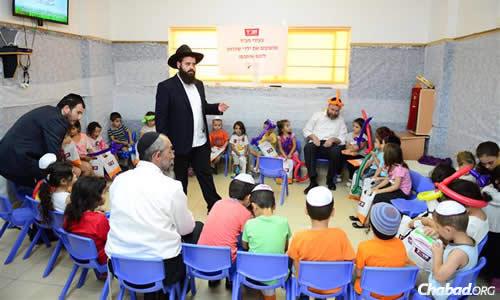
Earlier this week, CTVP implemented a three-pronged emergency initiative that includes (1) organizing buses to take children to the center of Israel, out of the range of the rockets and able to have a respite from their anxiety; (2) coordinating with all of centers in the region to organize activities and visits to bomb shelters to support families; and (3) keeping up a steady stream of volunteers going to the front lines to boost the morale of the soldiers, as well as give them spiritual and physical nourishment.
Following a notification that the center of Israel was no longer considered a safe destination, the decision was made to stop busing children there. Instead, the carnival games and performers were taken south to bring a much-needed diversion to the children, right near their homes.
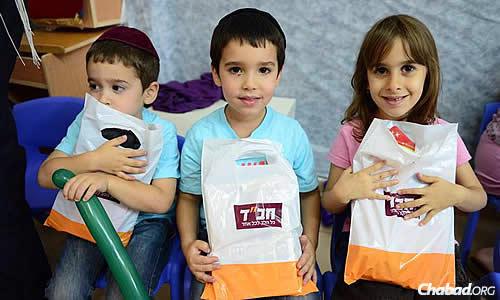
So on Thursday, a group of rabbis and CTVP volunteers went to hard-hit Sderot in the south with entertainers, including clowns and balloon makers. They also brought the kids games, treats and activity bags.
“We do what we can to bring happiness,” said Swerdlov.
Joining Swerdlov was Rabbi Aharon Prus of Tzerei Agudat Chabad Headquarters Israel in Kfar Chabad, Israel, and Rabbi Chaim Nochum Cunin, visiting from Chabad West Coast Headquarters in Los Angeles. They worked with Rabbi Moshe Pizem and his son, Rabbi Asher Pizem, both of Chabad of Sderot, Israel, to keep the little ones busy.
Working to Boost Morale
The group of rabbis also went to visit soldiers on the front lines and at bases. They wrapped tefillin with many of them standing beside tanks and army paraphernalia, and recited prayers for their safety. CTVP representatives also offered soldiers care packages, including food and toiletries, and spent time just talking with the men and reassuring them.
And they went out and bought pizzas to a group of reservists who follow special dietary laws above the standard kashrut of the army.

Cunin recounted one particular soldier’s response to the Chabad visitors: “We sit here like it’s [the mournful day of] Tisha B’Av, and then you come along and it’s like [the joyous holiday of] Simchas Torah.”
Many Chabad communities are holding “lend an arm for Israel” campaigns—urging men and boys to don tefillin, a mitzvah the sages say strikes terror in the heart of her enemies.
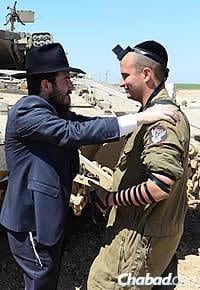
In 1967, prior to the outbreak the Six-Day War, the Rebbe introduced what was to be the first of the 10 “mitzvah campaigns” (“mivtzaim”)—the campaign to don tefillin with all Jewish men.
Mirroring the Rebbe’s call, Chabad emissaries are redoubling their efforts to encourage their community members to share the mitzvah with people who may not lay tefillin on a daily basis.
And everywhere, women and girls were encouraged to light Shabbat candles.
Chabad.org has offered a list of practical action to assist Israelis, as well as some inspiration from the Rebbe here “What Can I Do to Help Our Brothers and Sisters in Israel?”
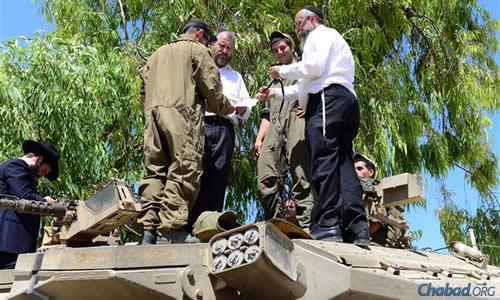





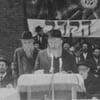



Join the Discussion